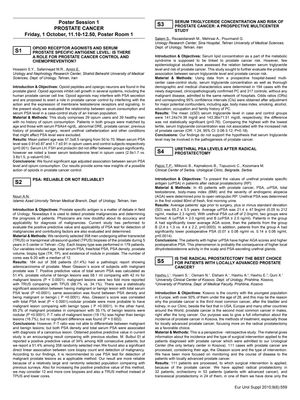S2 PSA: Reliable or Not Reliable?
September 2010
in “
European Urology Supplements
”

TLDR PSA testing is a reliable method for detecting prostate cancer, and opioids may lower PSA levels, but triglycerides don't affect prostate cancer risk.
The document presents findings from several studies related to prostate cancer, with a focus on the reliability of prostate-specific antigen (PSA) testing and the potential role of opioids in prostate cancer control. One study involving 29 opium users and 39 non-users found a significant association between opium consumption and lower serum PSA levels, suggesting opioids might play a role in prostate cancer control. Another study with 358 men undergoing prostate biopsies reported a positive predictive value of 51.4% for total serum PSA in detecting prostate cancer, which is higher than previous studies, and recommended the use of PSA testing as a reliable method for detecting malignant prostate lesions. A third study with 194 cases and 317 controls found no significant association between serum triglyceride levels and prostate cancer risk. Lastly, a study of 45 patients after radical prostatectomy found that higher urethral PSA levels were associated with higher androgenic alopecia scores and higher postoperative PSA, suggesting a link between local dihydrotestosterone activity and PSA secretion. Overall, these studies contribute to the understanding of PSA's reliability in prostate cancer diagnosis and the potential influence of opioids and triglycerides on prostate cancer.





